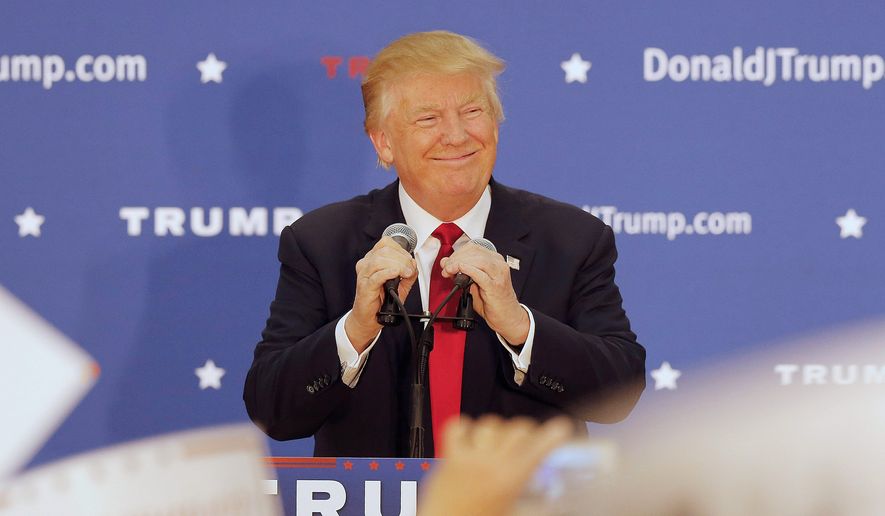As he extends his lead in the Republican presidential race, billionaire businessman Donald Trump keeps bucking his party establishment and confounding predictions of his imminent downfall.
His success has come not just from being an outsider but also from being fiercely anti-establishment, railing against the government and the institutions that he hopes to lead. It’s a freewheeling style made possible by Mr. Trump’s loose ties to political ideology.
“He’s not bound by ideology in a traditional sense,” said David W. Rohde, a political science professor at Duke University.
Mr. Trump is not a tea party constitutionalist or a pro-business Republican or a small-government conservative. He is strictly pro-Trump.
“Trump’s presentation is that everybody in government is incompetent or evil and if we just give the power to him he will make things just fine,” said Mr. Rohde. “It’s the presentation of those ideas is what leads to his success. It is coupling those views with a lot of anger and ridicule that a segment of the Republican Party finds appealing.
“Now a whole lot of people find it not appealing,” he added.
SEE ALSO: Donald Trump holds 10-point lead over No. 2 Marco Rubio: poll
Mr. Trump climbed to 27 percent at the top of a Quinnipiac University poll released Wednesday, up from 24 percent in the same survey last month.
Mr. Trump bested the competition with a variety of Republicans, including voters who described themselves as tea party, extremely conservative and moderate or liberal. He also won among men and women who vote Republican, according to the poll.
Voters who described themselves as “somewhat conservative” broke the trend to back Sen. Marco Rubio of Florida over Mr. Trump, 26 percent to 25 percent.
Sen. Ted Cruz of Texas tied Mr. Trump at 24 percent support from Republicans who identified themselves as born-again Christians and evangelical voters.
Mr. Trump registered the widespread popularity despite repeated flaps in the news media over his inflammatory rhetoric and antics on the stump, including mocking the jerking gestures of a disabled newspaper reporter.
Retired neurosurgeon Ben Carson, who ran a close second to Mr. Trump last month, plummeted to third place in the latest poll amid doubts about his ability to lead on foreign policy and confront terrorism. He tied for third with Mr. Cruz at 16 percent.
Mr. Rubio finished in second place with 17 percent, according to the survey.
Among voters whose top issue was jobs and the economy and voters whose top issue was terrorism, Mr. Trump held a double-digit lead. However, voters who named foreign policy as the top issue favored Mr. Rubio over Mr. Trump, 22 percent to 19 percent.
Joe Dugan, founder and executive producer of the South Carolina Tea Party Coalition Convention, said a cross-section of Republican voters feel betrayed by the party establishment. The 2014 wave election delivered Republicans control of the House and the Senate, yet progress on a conservative agenda has stalled.
“Donald Trump rose up because people viewed him as a man of achievement and action, who would take charge and get things done. Not the things the politicians wanted but what the people wanted,” he said.
“To some, his language may seem a little brash, but after the deceit and deception that is Washington, it seems almost refreshing. Politicians, with rare exceptions, have lost all credibility, so the people have seized on the anti-establishment alternative to preserve what is left of our tattered Republic,” Mr. Dugan said.
Still, the poll revealed weaknesses in the Trump campaign.
Among likely Republican voters, 26 percent said they “would definitely not support” Mr. Trump, which was similar to the 21 percent who would not back former Florida Gov. Jeb Bush, an establishment favorite who is stuck in the middle of the field with 5 percent of the vote.
What’s more, the poll found that Mr. Trump lost in a theoretical matchup against Democratic presidential front-runner Hillary Clinton, 47 percent to 41 percent.
Mrs. Clinton, who is the odds-on favorite to win her party’s nomination, topped all the Republican hopefuls.
She beat Mr. Carson 46 percent to 43 percent, Mr. Cruz 47 percent to 42 percent and Mr. Rubio 45 percent to 44 percent, according to the poll.
The data fueled fears in the Republican Party that Mr. Trump would be unable to overcome having the largest gap against Mrs. Clinton among the top-tier contenders and that he would be unelectable in a general election.
“Trump is channeling the anger that so many voters have against the way things are run in Washington. He also speaks directly while throwing caution to the wind, which attracts voters as well,” said Republican political strategist Ron Bonjean. “But Trump will not win the White House because he’s alienating too many different constituencies such as Hispanic and female voters.”
• S.A. Miller can be reached at smiller@washingtontimes.com.




Please read our comment policy before commenting.